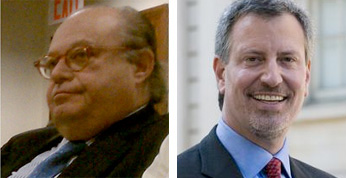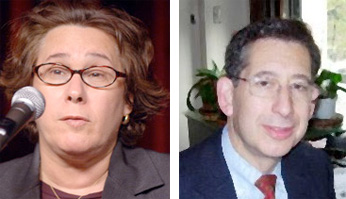Editor’s note: With yesterday’s appellate ruling prolonging the Prospect Park West case, Streetsblog is running a refresher on the how the well-connected gang of bike lane opponents waged their assault against a popular and effective street safety project. This is the fifth installment from the six-part NBBL Files.
This piece originally ran on November 10, 2011.
This is the fifth post in a series examining the tactics employed by opponents of the Prospect Park West redesign. Read the first, second, third, and fourth installments.
For a few months in the beginning of 2011, hardly a day went by without some political figure or media pundit inveighing against bike lanes and the Department of Transportation. The attackers ran the gamut from Staten Island Republicans to Democrats holding citywide office, from tabloid editorial boards to columnists for highbrow glossy mags. The story swirling in the middle of it all surrounded a bike lane about a mile long on Brooklyn's Prospect Park West, which had the backing of most local residents but irritated some powerful neighbors.

Even the most rational observer had to question, at times, whether the multi-pronged attack on the city's bike policy was really a coincidence. And it turns out that in fact, the self-proclaimed "Neighbors for Better Bike Lanes" had several previously unreported connections to the bikelash of 2011, according to email communications obtained by Streetsblog via freedom of information request.

In some cases, NBBL joined up with other bike lane foes after observing them from afar. In others, they had a direct hand in ginning up bad press for bike lanes and DOT. Sometimes they got what they wanted out of their political and media connections. Other times their gambits seemingly went nowhere. And on occasion their efforts completely backfired. We'll explore these connections in two posts: This one deals with their political and professional contacts, and the next one with their media contacts.
The picture that emerges of NBBL's behind-the-scenes lobbying contrasts starkly with the process that led up to the installation of the PPW bike lane. While the neighborhood advocates and civic groups who supported the bike lane gathered signatures and helped shepherd the project through the community board process, the opponents traded on their extensive Rolodexes and high-level connections to undermine the bike lane in a secretive and sophisticated campaign.
Two major NBBL players should be familiar if you've been following the story: Iris Weinshall, former DOT commissioner and wife of United States Senator Chuck Schumer; and Norman Steisel, sanitation commissioner for Ed Koch and first deputy mayor under David Dinkins. The constellation of former city bureaucrats who put their government contacts to use opposing the Prospect Park West bike lane also includes Bob Linn, city personnel director under Koch, and Connie Christensen, a former arts commissioner.
Note: Streetsblog has already covered NBBL connections to Senator Chuck Schumer, former deputy mayor and Gibson Dunn partner Randy Mastro, City Council Transportation Committee Chair Jimmy Vacca, and Brooklyn Borough President Marty Markowitz. They are for the most part not included in this piece.
NBBL Spoke With the Public Advocate, City Council Members, Borough Presidents and City Hall About PPW Lane
NBBL leaders Steisel, Louise Hainline, and Lois Carswell, as well as their attorney, Jim Walden, attended a meeting with Public Advocate Bill de Blasio on February 9 (Weinshall was out of town). The meeting was "to discuss bike strategy" according to a confirmation message from de Blasio scheduler Ellyn Canfield Nealon. De Blasio's office has not returned an inquiry about who called the meeting and what was discussed.
One month after that meeting, however, de Blasio sent a letter to Janette Sadik-Khan calling DOT's evaluations of its own projects, including of the PPW lane, "rubber stamps." Impugning the integrity of DOT's project evaluations echoes a major theme in the NBBL lawsuit. The Post picked up de Blasio's letter a week later, when DOT publicly abandoned plans for the 34th Street separated busway.
In a more unusual alliance (between the wife of a prominent Democrat and a local Republican politician), Weinshall spoke with Staten Island City Council Member James Oddo on multiple occasions about obstructing bike lanes.
After the bike lane on Staten Island's Father Capodanno Boulevard was removed in November 2010, Weinshall got in touch with both Oddo and Borough President James Molinaro to learn how they prevailed upon City Hall to take the lane out.
"It would be nice to know how the bp and councilman got it done, whether it was bareknuckles politics or analytic research of impacts etc or a combination," Steisel wrote on the 23rd.
"I know him well... will call him and Oddo," responded Weinshall.
Steisel then suggested that Randy Mastro, the one-time Giuliani deputy mayor who had arranged to give NBBL Gibson Dunn's pro bono services, could serve as a go-between for the Democrat-heavy NBBL to the Republican Molinaro.
In January, Weinshall spoke with Oddo again, and Oddo looped her in immediately when he proposed requiring environmental review for all new bike lanes.
One of Weinshall's most direct, though ultimately less effective, connections was to Deputy Mayor Howard Wolfson, who was communications director for Chuck Schumer during his first Senate run. Marty Markowitz routinely forwarded constituent letters regarding Prospect Park West to Weinshall. When she came across one she particularly liked, she forwarded it along to a Wolfson aide. "Putting it on his desk now," was the reply, seven minutes later. Weinshall later invited Wolfson to tour the bike lane with her, an invitation Wolfson accepted.
The NBBL entreaties seem to have backfired, however. Wolfson ultimately emerged as one of the city's top defenders of bicycle infrastructure.
NBBL Targeted Contacts at City Planning, Landmarks Commission, and Public Design Commission as Potential Allies
Bike lane opponents Norman Steisel, Bob Linn, and Connie Christensen called on extensive contacts from their time in government, seeking to enlist senior staff at city agencies in their cause. For the most part these entreaties seem to have dead-ended, but they illustrate a key component of NBBL's strategy: to foment a kind of civil war within the Bloomberg administration, pitting high-level officials against NYC DOT.
Last summer, Steisel reached out to his former boss Ed Koch about the PPW bike lane and received some assistance from Koch's former chief of staff, Diane Coffey. "On confidential basis to you, I had lunch with mayor Koch on a number of issues," reported Steisel to NBBL on August 10, 2010. "Also attending was his close confident Dianne Coffey who told me she introduced Bob Linn to [Planning Commissioner] Amanda Burden who in turn sent someone out to check situation in field, a visit Diane thought has occurred, as well as to do additional analyses."
Linn, who served as the city's chief labor negotiator and personnel director under Koch, replied that he had been in touch with Burden, but had not received a report. By that time, Linn had also spoken to Landmarks Commissioner Bob Tierney and First Deputy Mayor Patti Harris, widely acknowledged as Bloomberg's most trusted lieutenant. Tierney and Harris both have close connections to the Koch administration themselves. Tierney served as counsel to Mayor Koch while Harris worked for Koch both when he served in Congress and in City Hall.
Linn's contacts with Burden, Tierney, and Harris were apparently fruitless for NBBL. Linn gradually dropped out of active participation in the group, and after August, 2010 he appears to have stopped replying to Steisel and Hainline when they tried to follow up with him.
The other agency NBBL courted was the Public Design Commission. The PDC must approve the design of most permanent works of art, architecture or landscape architecture proposed for city-owned property, and NBBL had hoped to get them to nix the PPW bike lane. NBBL member Connie Christensen, a lawyer and one-time member of the city's Art Commission (the precursor of the PDC), reached out to her former colleagues, urging them to stake a stand against the aesthetics of the bike lane. Christensen ended up writing an op-ed for a publication targeted at former commission members. She also spoke with Libby Ryan, who sits on the Landmarks Commission, and offered to team up with Linn to lobby Amanda Burden.
Weinshall Enlisted Engineer Philip Habib to Help NBBL
Streetsblog has previously reported that Iris Weinshall and Louise Hainline, both CUNY executives, tried to enlist CUNY professor Robert "Buzz" Paaswell to assist them. He wasn't the only transportation expert to whom Weinshall reached out.
Transportation consultant Philip Habib agreed to meet with Hainline at Weinshall's request in the summer of 2010. Habib's firm has performed transportation planning for major projects including the World Trade Center reconstruction, Donald Trump's Riverside South developments and the Time Warner Center. His primary suggestion to Hainline, on July 1, 2010, was to sue the city over the bike lane. He appears to have been the first to recommend this course of action; no NBBL communications mention legal action prior to July.
Weinshall also relied on another CUNY-employed transportation expert for assistance. Judy Bergtraum served as Weinshall's deputy at both DOT and at CUNY, and Weinshall routinely consulted her former first deputy commissioner about Prospect Park West. In a typical conversation last November, Weinshall asked Bergtraum whether bike lanes needed to go through ULURP, the city's land use review process. "Any word on ULURP of bike lanes?" wrote Weinshall. "No not yet," responded Bergtraum. "I am meeting with philip habib this afternoon… i will ask him." This conversation took place during the afternoon on the Monday before Thanksgiving, over CUNY e-mail accounts.
Weinshall also turned to Bergtraum when she had questions about the statute of limitations on Article 78 lawsuits (the type of lawsuit NBBL eventually filed against the city) or whether the city's bicycle master plan had gone through environmental review when first written. Bergtraum's involvement in the Prospect Park West fight extended beyond factual inquiries; Weinshall also informed Bergtraum when this reporter reached out to Weinshall for comment.
In the next installment we'll take a closer look at NBBL's media connections. Stay tuned.





